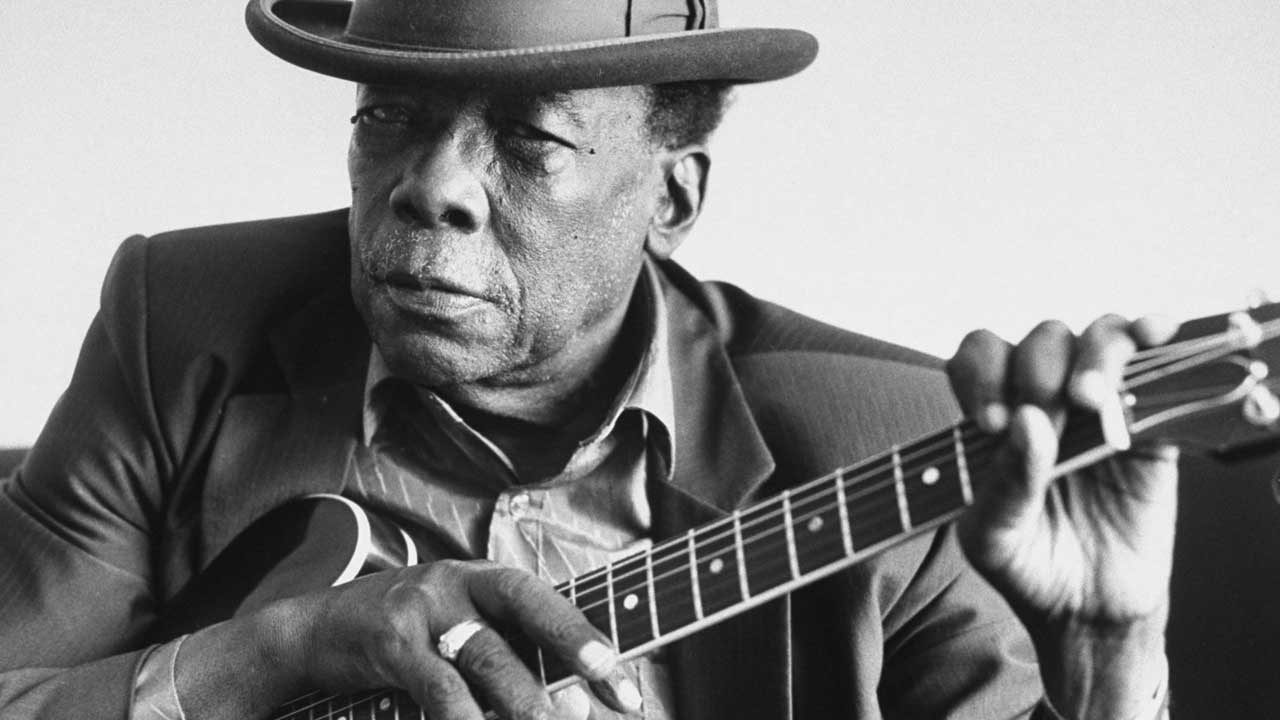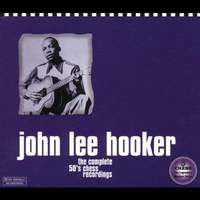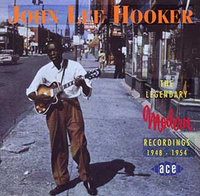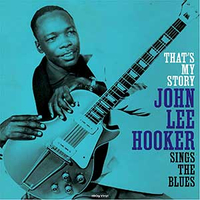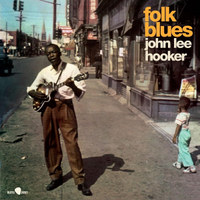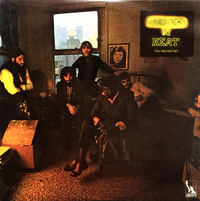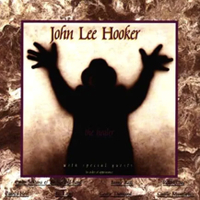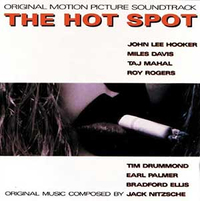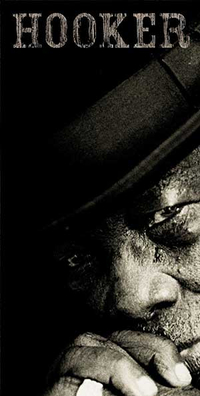Of all the postwar blues giants, John Lee Hooker was the rock star. The bluesman’s rebel streak was already in evidence when – aged just 14 – he ran away from the Mississippi farm of his childhood and a minister father who “thought the guitar was the Devil’s work”.
Yet Hooker’s true rebellion was his blood-oath to play the blues his way. Defying genre dogma and mangling song structure, his hypnotic riffs and acetate-ancient voice won him fanboys from Keith Richards to Carlos Santana. But for all the fame and fortune, you only had to look at Hooker’s face – impassive beneath the trademark hat and shades – to sense his higher purpose.
“The blues is my life,” he said in 1990. “I am the blues. I’ll never get out of them alive.”

The Complete ’50s Chess Recordings (Chess, 1998)
Scraping by as a school janitor when his recording career began, you couldn’t blame Hooker for hustling his way through the early-’50s.
Coining and shedding aliases to let him record outside his contract with the Modern label – depending on the session, he might be billed as the Boogie Man or John Lee Cooker – the bluesman’s cash-in-hand years are a thrilling ragbag, perhaps with more diamonds out there yet to discover.
In the meantime, this Chess comp is the closest thing to definitive, home to foot-stomping one-man classics like Mad Man Blues, Leave My Wife Alone and Sugar Mama.
The Legendary Modern Recordings 1948-1954 (Ace, 1993)
They overlap with the Chess collection, but these early sides are the rough ‘n’ ready cousins and where all the Hooker tropes began, from the primal single-chord groove to the parchment-paper drawl.
You can’t not know the million-selling Boogie Chillen’ and I’m In The Mood – blues benchmarks which Hooker later reflected brought in “what I call the big money”.
But there’s further gold amongst these 24 tracks, from the never-bettered Crawlin’ King Snake to Sally Mae’s pot-shot at a runaround lover. Stick around for the second half, too, where Hooker rolls the amp and mobilises a thousand pimply British Invaders.
That’s My Story (Riverside, 1960)
By the turn of the decade, with Hooker’s electric-warrior schtick threatening to calcify into cliché, Riverside Records fitted him out for a new set of country-blues clothes.
With label founder and producer Orrin Keepnews losing the hornet-in-a-tin electric guitar tone for a more acoustic-led and coffee house-friendly vibe, That’s My Story split fan opinion.
Yet if they’re short on wattage, these tracks hardly lack power: Gonna Use My Rod is a blunt warning to a suitor (“I ain’t gonna tell you no more/Leave my old wife alone”) while the deep-down vocal and locomotive propulsion of I Need Some Money makes the Beatles’ 1963 cover sound like pipsqueaks wheedling for pocket money.
More sunken treasure from the vault – finally exhumed by the Modern label’s Crown imprint a full decade after the sessions – Folk Blues is the logical next stop for fans of Hooker’s unvarnished early-’50s output.
Occasionally backed on guitar and vocals by sideman Eddie Kirkland, the bluesman has rarely sounded so hypnotic, his trance-like guitar patterns on songs like Bad Boy and Down Child both mesmeric and faintly menacing. Meanwhile, Folk Blues’ title belies the feedback howl of standouts like Baby I’m Gonna Miss You – the sound of a man whose primal instincts were impossibly exciting.
Hooker ’N Heat (Liberty, 1971)
As blues scholars and white America’s preeminent purveyors of groove, Canned Heat proved perfect foils to their hero on this twin-headed double album. By ’71, Hooker had yet to see a financial return on his inestimable contribution to the blues boom.
Hooker ’N Heat changed all that, with co-founders Alan Wilson and Bob Hite putting the boogie man front and centre. The early tracklisting is practically a solo album, and when the sound fills out on later cuts like Whiskey And Wimmen and a monumental eight-minute Boogie Chillen’ No.2, sparks fly. Tragically, Wilson died before its release: he chose a good one to bow out on.
Hooker looked all washed up by the late-’80s, releasing sell-nothing albums on small-fry labels, his star now hanging so low that he was even cut from the Blues Brothers soundtrack.
Instigated by Carlos Santana, The Healer was the turning-point: an all-star resurrection where notables from Bonnie Raitt to Robert Cray lined up to paint him relevant. The respect was writ large on new readings of ’50s benchmarks like Sally Mae, but there was no doubting the fresh impetus on the title track: a six-minute breezing blues-rumba made even more extraordinary by the revelation that it was cut in a single take.
Jack Nitzsche - The Hot Spot (Antilles, 1990)
Few cinema-goers saw Dennis Hopper’s Texas neo-noir, fewer still liked it. The only element to escape with any credibility was the Jack Nitzsche-composed soundtrack, which teamed Hooker with Miles Davis – with a little help from Taj Mahal and Roy Rogers – and very nearly delivered on the sum of their parts.
The keyword here is ‘atmosphere’: check out the dusty slow-strut of Coming To Town, Hooker’s wiry guitar runs and largely wordless ‘mmm-hmmm’ vocals jousting with Davis’s roaming horn work, and proving the veteran bluesman a better storyteller than most screenwriters. On an underrated set, the End Credits are best: an addictive groove that rolls for almost six minutes.
Come See About Me (Eagle Vision, 2012)
If Hooker’s death in 2001 left a box unticked, it was the lack of a definitive audio-visual document. Come See About Me saw to that, in style. This first official DVD from the boogie man’s estate spanned from monochrome ’60s archive footage to the unlikely MTV-era upturn, the Hook looking reliably ice-cool throughout.
And while there are more garrulous stars, the talking heads pick up the slack, with Santana, Raitt and Charlie Musselwhite offering insight, Van Morrison blowing harp on Baby Please Don’t Go – and the Rolling Stones and Eric Clapton outgunned on a live run through Boogie Chillen’.
Hunting down Hooker’s catalogue piece-by-piece is a labour of love, but for instant gratification, this four-disc set is the one. Cherrypicking the Detroit era, mining the Vee Jay run for classics like Boom Boom, and sprinkling key cuts from the folk period, the vital early years are generously represented here.
Post-slump, as the bluesman evolves into a crossover star, the compilation hits another rich seam with the tracks you’d hope for – including a glorious hook-up with Los Lobos on Dimples. This is Hooker in excelsis: if your foot isn’t tapping, you’re already dead.
